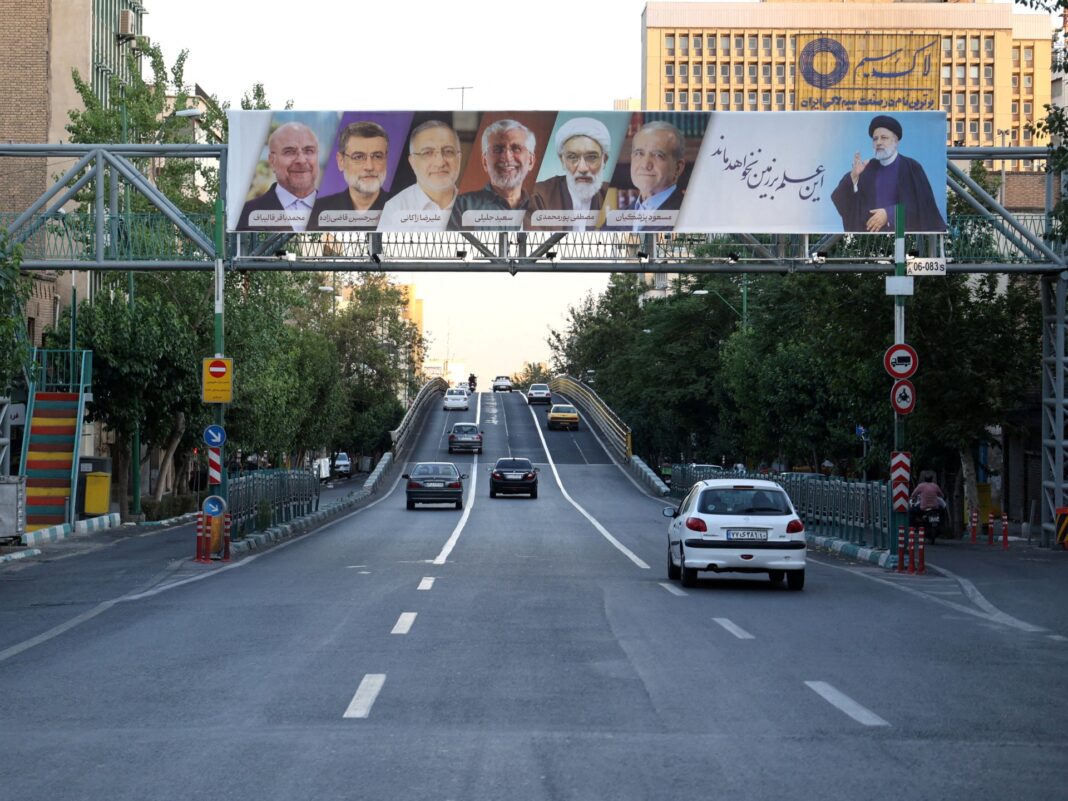Tehran, Iran – As Iran’s presidential election draws closer, the field of candidates has become narrow after two withdrawals, with a sense of suspense lingering as the fate of the election hangs on who stays as two of the strongest candidates are reportedly negotiating.
Tehran Mayor Alireza Zakani and government official Amir-Hossein Ghazizadeh Hashemi are out, and a run-off appears inevitable if no one else withdraws amid an air of voter apathy.
Here’s where we are with the Iranian presidential election, which comes a year early due to the death of President Ebrahim Raisi and seven others, including Foreign Minister Hossein Amirabdollahian, in a helicopter crash on May 19.
Who’s still running?
Out of 80 people who submitted candidacies, six were approved by the Guardian Council, a constitutional vetting body, and out of them, the following remain:
Mohammad Bagher Ghalibaf, the conservative incumbent parliament speaker, used to be mayor of Tehran, police chief, and commander of the Islamic Revolutionary Guard Corps (IRGC).
Saeed Jalili, the hardline senior member of the Supreme National Security Council, wants the presidency after numerous failed attempts, just like Ghalibaf.
Masoud Pezeshkian, the only moderate candidate allowed to run, is a former health minister and longtime lawmaker who has secured backing from former presidents and other senior centrist and reformist figures.
Mostafa Pourmohammadi, a former interior and justice minister, is a conservative Muslim scholar from the security apparatus. He is not considered an ally by the other conservatives due to some of his views and has said he knows he has few votes.
Since no candidate has a clear majority, a run-off scheduled for July 5 appears certain – unless either Jalili or Ghalibaf withdraw in the other’s favour.
What are Iranian presidential elections like?
Widespread voter apathy has dogged Iranian elections for several years, with roughly half the eligible voting population projected not to vote.
Supreme Leader Ayatollah Ali Khamenei, the military, the IRGC, and the candidates have emphasised the importance of voting, with Khamenei saying not participating would make Iran’s “enemies” happy.
Choosing the Iranian president has often been framed as reformist versus more establishment-oriented candidates. This year, it was five conservatives and hardliners against one reformist-backed centrist.
While each candidate tried to differentiate themselves from their rivals this year, there were some commonalities.
All candidates pledged allegiance to Khamenei and promised to obey him. They also praised the IRGC and rejected any anti-establishment sentiment.
All the candidates addressed some of the issues facing Iran, more about that below.
What were the candidates’ platforms?
Approved candidates had less than three weeks to present themselves to the public in five four-hour debates, televised programmes, campaign rallies and stadium events across Iran.
They agreed on some issues facing Iran, like inflation, unemployment, corruption and political infighting on the domestic front, and navigating a complicated landscape abroad as Iran battles sanctions and pressure from the United States and its allies.
However, they offered little detail when it came to solutions, often resorting to insubstantial statements, attacking other candidates or blaming past governments for some of Iran’s decades-old problems.
Asked what concrete measures he would take on women being arrested in the streets for not following mandatory hijab rules – an issue that prompted months-long deadly nationwide protests in 2022 and 2023, candidate Jalili insisted that the interviewer did not understand the “strategic depth” of the issue and refused to elaborate.
Jalili did promise a reduction of inflation to single digits from more than 40 percent and a whopping annual gross domestic product (GDP) growth rate of 8 percent – both uphill tasks if not nigh on impossible.
Ghalibaf also made big promises – to ensure workers’ wages rise on par with runaway inflation, to give free land to young couples and people who do not own homes, and to greenlight car imports, reversing a years-long ban.
He also promised to build a wall along Iran’s borders with Afghanistan and Pakistan to manage mass migration.
Pezeshkian hit reformist talking points: restoring Iran’s 2015 nuclear deal with world powers, bridging the gap between people – especially women – and the establishment, managing energy subsidies better, and appointing officials based on expertise, not political connections.
Sounds good so far…
Yet, there was some discord as several candidates accused others of registering only to raise their public profile or to cover for allied candidates.
“You didn’t stay!” sneered Pezeshkian at Zakani in a post on X after the mayor withdrew on Friday, breaking repeated promises that he would stay to become president.
Most attacks focused on Pezeshkian, who rejected the notion that he would merely be leading a third Hassan Rouhani term, referring to the centrist president who preceded Raisi.
Rouhani got involved, releasing a video railing against unnamed establishment hardliners – implying Ghalibaf and Jalili, among others – accusing them of harming Iran and its long-term interests just to undermine his administration.
An incensed Rouhani said the hardliners will face the issues they caused, including lacklustre international banking relations caused by the failing nuclear deal and anti-money laundering and “terrorist” financing regulations of the Financial Action Task Force (FATF).
Iran, Myanmar and North Korea are the only countries blacklisted by FATF. Iran’s Expediency Council arbitration body blocked the implementation of FATF’s regulations, guaranteeing difficult, if not impossible, international banking relations. Critics of FATF argued that the transparency rules would limit Iran’s ability to circumvent sanctions and fund its “axis of resistance” across the region.
“You took us back to the Qajar era,” said Rouhani, in reference to an Iranian dynasty infamous for inefficiency that was deposed in 1925.
“Repent, apologise to the people.
“Although your repentance will not be accepted, neither will the nation accept your excuse.”







